Matthew Might, a computer science professor at the University of Utah, writes: “Every fall, I explain to a fresh batch of Ph.D. students what a Ph.D. is. It’s hard to describe it in words. So, I use pictures.” It’s September 26. That means fall is here again, and it’s time to bring you an encore presentation of Matt’s Illustrated Guide to the PhD. Have a look, and you’ll see the whole undertaking in a less hubristic way:
Imagine a circle that contains all of human knowledge:
By the time you finish elementary school, you know a little:
By the time you finish high school, you know a bit more:
With a bachelor’s degree, you gain a specialty:
A master’s degree deepens that specialty:
Reading research papers takes you to the edge of human knowledge:
Once you’re at the boundary, you focus:
You push at the boundary for a few years:
Until one day, the boundary gives way:
And, that dent you’ve made is called a Ph.D.:
Of course, the world looks different to you now:
So, don’t forget the bigger picture:
Keep pushing.
You can find Matt’s Illustrated Guide hosted on his web site. This guide/reality check is published under a Creative Commons License. You can also buy a print version for $6.50. (The money goes to charity.) Matt offers more insights for Ph.D. students here.

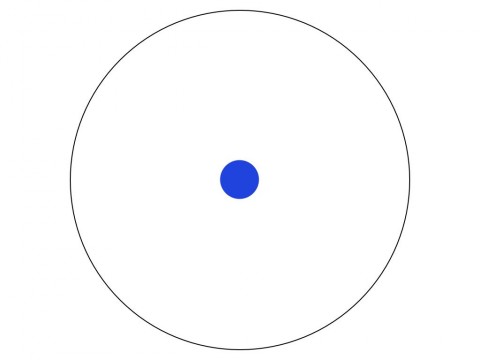
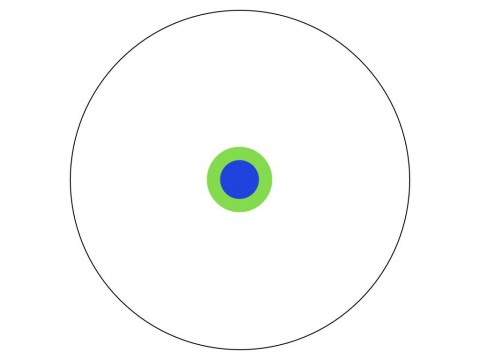
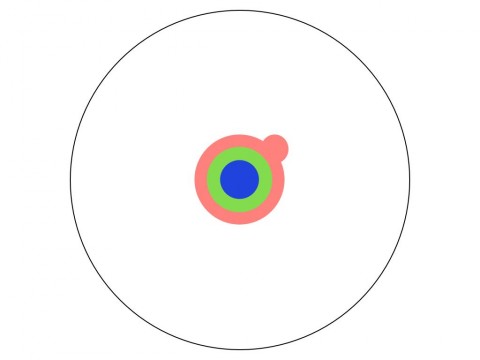
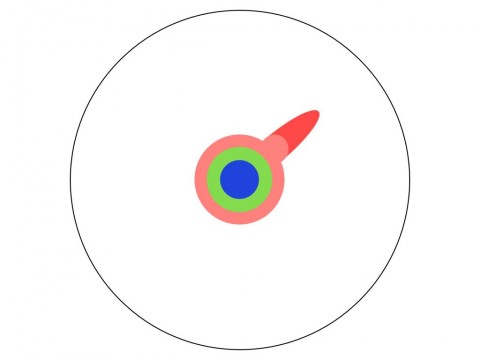
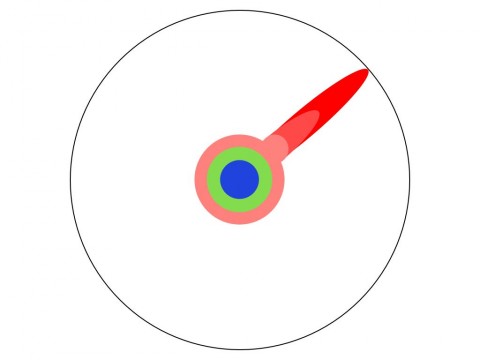
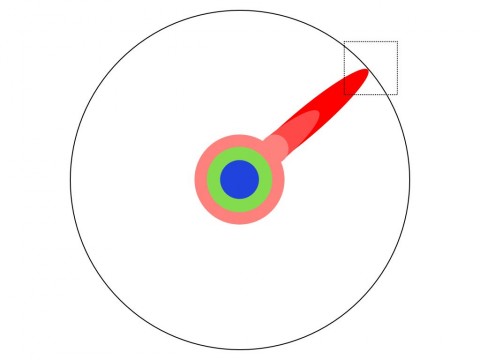
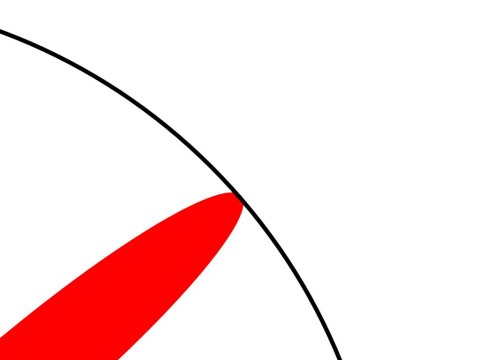
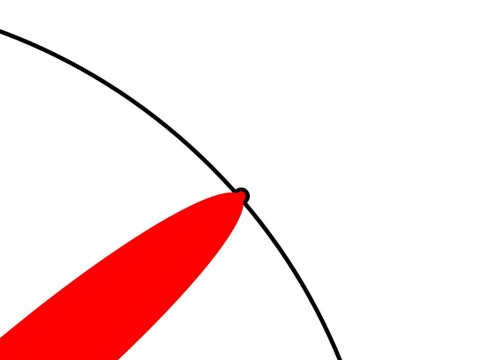
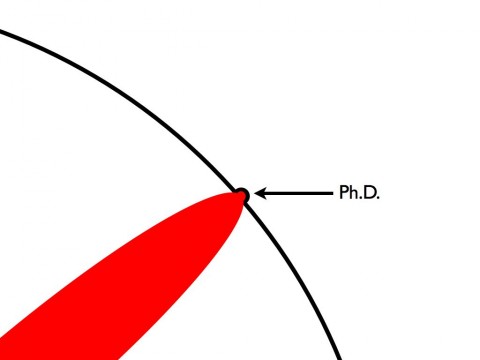
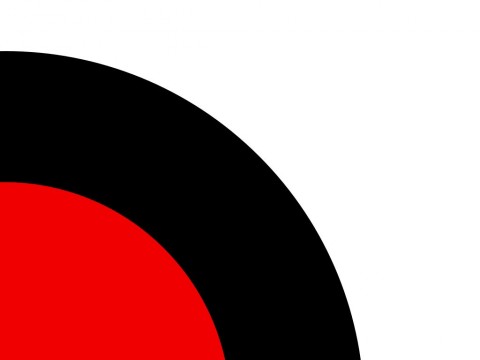
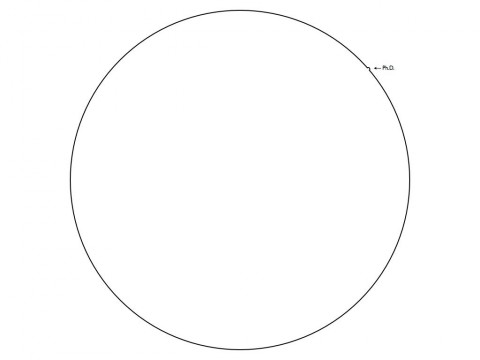


Wait, but you left out the final sentence at the end of the illustration! It isn’t complete without it …
I remember watching someone one campus bang at the bottom of their car for a good 10 minutes with a hammer. I watched as a police officer stopped, talked to the man, watched him, then left, followed by some maintenance vehicle, who stopped, watched the man, and then left. I finally went over to the exhausted, defeated man and asked if I could help. He said that he had a flat tire and that the spare was stuck under the car. I asked if there was an owner’s manual in the glove box, and he said he didn’t know. We looked, found the owner’s manual, and within 60 seconds had released the tire from under the car. nHe laughed and shrugged his shoulders and said ‘they don’t teach us professor’s these kinds of things!’ We put the tire on and he was appreciative. nI am not a smart man, but I know where to find the owner’s manual in cars and how to follow directions. It is my observation that specialization can have the devastating effect of ‘the death of the generalist.’ Even just basic knowledge.…such as that of our grandparents’ generation. People may know a lot about microbes or strategies to deal with inflation or about questions like ‘what is science?’ or ‘what is morality?’, but a world that has more philosophers than plumbers will soon find itself without water or the pipes to carry it.
could you have just told us in the beginning their are bumps on the circle ?
For whatever it may be worth: As the number of dents increases around the ring, the sum total of human knowledge increases. Right? Then, after averaging, the circle becomes a bit bigger. Make sense? I don’t have a Ph.D. and won’t go for one.
I think it’s better to think of it as documenting that whole strand of knowledge and extending it slightly, not actually making it anymore known neccesairly. I’ve come up with lots of things during my undergrad their just not documented the ideas and knowledge still exists. PhD are the documentation of knowledge to make sure humanity will never lose it, or let science delve too far into mysticism.
Thank you for this illustration.
As a doctoral student in Educational Technology, I’ve been heavily influenced by a theory of learning and knowledge known as connectivism. George Siemans, at Athabasca University and Stephen Downes, at the National research Council of Canada originated, applied, and developed the concepts of connectivism.
Knowledge creation and learning is associated with making connections, both neuronally and between understandings. Connections may light up or activate a network of associations together…as in pattern recognition. New knowledge as in doctoral research captures new networks of connections. so the graphic of knowledge, if you will would look more like a dense mat of connections…I think rather like the blogosphere. Ph. D. research interpolate, extrapolates new networks of connections from existing knowledge maybe with very disparate entities along the x and y axis such as Biology and Mechanics to create hybrid knowledges like Bio-Mechanics. Alternatively a Venn diagram could illustrate knowledge creation.
I find it funny when the really “smart” people reply to this and miss the obvious point he’s making. Be humble and keep perspective.
Getting a PhD is just the first step, a research career clearly does not end there. Once someone has proven they can make a bump, then the real expansion begins. That little bump gets more prominent with each new research paper published, each hopefully more impactful than the PhD project itself.
The day I got my PhD I went to the grocery story to buy stuff for a celebratory meal. I had to wait in the checkout line for 20 minutes. A reminder from the universe that it all matters, but not very much.
I would think the vast majority of people getting a Ph.D. never actually make a bump. They are stating something already known in a different way that satisfies their dissertation committee.
I agree with Phil. With the rare and special exception, Ph.D students simply stuck it out. A masters now is what a BS was to our parents.
What about the post doc (or post docts) ? Is this lateral knowlege and where are you starting in the circle ?
So they’re the pimple on the ass of all human knowledge?
A grad school professor of mine took a few days off of the regular curriculum to talk about what happens when one finishes their degrees It was his observation that, once someone got that piece of paper, they forgot the phrases “I don’t know” and “I was wrong.”
As a grad student who has worked for a psychopath within an institute of psychopaths I have to say that this is an incredible accurate description of our life. Thank you.
all I saw was some boobs and then an enlarging wiener??? what is that supposed to mean?
The nipple. You didn’t see the nipple?
“Aagay doed peachay choed” run ahead and forget the past.tat is y phd in biochemistry in applied field gets negative conc. lol
The way I see it is that it’s mostly a preferable way of spending one’s time to many other options which do not allow us this luxury. By its own nature it seems far too arguable to establish if we are actually adding to human knowledge! More hilarity should be implemented :)
I think this article was targeted to educated audience who appreciates usage of visual aid. What this article explains that knowledge is at a continuous momentum. As we grow up and not get educated. Our thinking and creativity ability is just a size of small circle. As we receive more and more education, our perspective changes about things and reality and when you get a Phd. You get an opportunity to challenge those logic and either deny it by rejecting the hypothesis/logic and explain a new theory or fail to reject H0.
So in a continuous momentum, if knowledge is constantly increases bump by bump and we dont educate our kids at a same ratio, our kids will be far from the reality and based assumptions not on the logic but on the preference of ppl surrounded by them.
ex: Human reproductive system and human anatomy
I agree with Phil’s earlier assertion, and also question as to why only institutionally approved knowledge is considered to add to human knowledge. I highly respect the academy, and what has been shared with me by instructors and classmates, yet I challenge the idea of being considered an “authority” because of the degree.
The problem for me is that the process of increasing the world’s knowledge a tiny bit seems to have reduced MY knowledge of anything other than that tiny bit.…
What surprises me most is the poor useof English and terrible spelling by responders…
@Bob Irving: Exactly. The reductionism inherent in the current modern “Western” knowledge acquisition path is sadsadsad. As is the lack of collaboration and the intensity of the competition on the “battlefield” at the outer edge.
@Gwenette Writer Sinclair:
Reductionism is a direct result of us being humans. We have limited perceptive capabilities and information retention capacity. Rough estimates put total memory between 1–10TB, more than likely around 3TB (Robert Birge, Syracuse University, 1996) with a useable memory that ranges depending on a myriad of environmental and biological factors.
Include the limited lifespan during which one has to succesfully assimilate and understand complex theories and the hordes of related notes on these theories. One human being is going to inherently be limited to a very fine point in the grander scheme when exploring the edges of human knowledge.
That’s unless you’re a physicist because then your knowledge trumps all knowledge, or a metaphysicist and have the ability to attain infinite wisdom and knowledge through enlightenment so screw science :p
I would certainly agree that the state of scientifict pursuit is bureaucratic and driven by the interests of the grant-giving parties. At the end of the day, what would you do? Give million dollar grants to research that has no practical application on a resource starved planet? I won’t be naive to say that all research is based solely on saving ourselves, there is substantial military interest as well. Maybe if/when we find ourselves in a less resource limiting situation we might once again do research for the sake of knowing.
For the moment, we need to save oruselves.
metaphysics has been falsified by postmodernity
Except Levinas’ very particular notion of metaphysics (Totality and Infinity Pt1 A)nnAlso, the postmodern condition does not falsify, it affirms.
Thatswweqwrt
phd = nipples of the world circle
Its true.
Last Point: Keep pushinggg… until it looks like a boob with erected nipple ;)
Screw it. Go to business school instead!
Replace “Knowledge” with “Industry” and the rest is the same. Whether that is a ‘good’ thing or not is up to you.
Some people’s bumps are bigger than other’s.
That’s what s/he said
Just to keep this in perspective, let’s not forget the definition of an expert: Someone who knows more and more about less and less until eventually s/he knows everything about nothing.
I remember a version of this circle when being given advice about teaching a short class.
As an instructor, you need to find out where the edge of the colored area is for the student. If you try to teach inside the colored area, they already know it, and you are wasting his time. If you try teaching in the red and the student’s limit is in green, he won’t be able to understand and you are wasting his time.
The instructor needs to present material outside of the student’s circle of knowledge, but close enough that the student can grasp it and incorporate it into and expand his circle.
The diagram says nothing about a Ph.D.; it shows that the author is self-centered.
what if the circle looks like a euclidean circle from above, but really its hyperbolic? then to the person who has the “bigger picture” the work of a phd student would appear to be infinitesimal in comparison to all knowledge. But zooming in we realise that the manifold isnt euclidean, and the actually area of that tiny dot is much larger than it seems..
This is the worst Analogy I have ever had the misfortune of coming across. so self indulgent and a complete load of bollocks to be honest. Good for you and your PHD bulge though. Good for you sir.
this is world where nothing is solved
WOT!
Hey guys, it’s just a way of thinking.
Become multi-disciplinary and think outside the circle.
If you only have one discipline your whole academic career will sit there like a bulldog fart.
There are other ways of thinking and doing, just ask the Universe.
That’s cute, but really it isn’t necessarily knowledge that has been enlarged, but unique printed material. Most dissertations are never read, and do not actually contribute to further knowledge (which is what the circle implies). The same with most academic publishing. Most publications are never actually cited (except perhaps by the authors themselves).
You clearly know something of generality by being so general.
“It is my observation…” And yet what escapes your thoughts in words becomes a point; go back to Figure 1: and begin again; you don’t pass go, and you don’t collect $200 for speaking generally by way of a specific reference called ‘John’.
Plenty of John’s like there is plenty of James’s, but I would never use a mallet to screw myself!
Interesting, so I suppose your environment and experience were not apart of your circle theory? A man with scholarly knowledge requires so much more to attain the greater human knowledge. Thankfully computer science has become a pimple on the advancement of humanity.
Research papers take you to the edge of human knowledge? You have obviously lived in a institutionalized box far too long.
I think there is also another circle before the elementary school that is pretty large. As you get older you realize that what children learn from their parent before they ever get into school has a lot to do with how much they learn thereafter. Yes, I also agree with the bump at the end from my own experience. The other extension is what you do with it after that. Do you continue to extend the bumps, or do you become a manager and retreat ?
Anyone else notice the phallic symbolism with this…
I think there is also another circle before the elementary school that is pretty large. As you get older you realize that what children learn from their parent before they ever get into school has a lot to do with how much they learn thereafter. Yes, I also agree with the bump at the end from my own experience. The other extension is what you do with it after that. Do you continue to extend the bumps, or do you become a manager and retreat ?